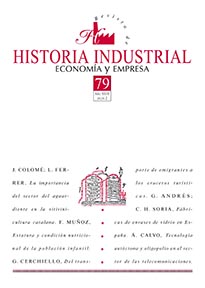From the transport of emigrants to leisure cruises. The transatlantic passenger shipping companies in Europe following the Second World War: the Spanish case (1945-1960)
DOI:
https://doi.org/10.1344/rhi.v29i79.29239Keywords:
tourism history, cruises, maritime transport, migration, BarcelonaAbstract
This paper seeks to address the strategic evolution of the transatlantic passenger shipping companies over the fifteen year period following the Second World War. It focuses on a very turbulent period of a shipping business principally based on emigration demand. During the period under consideration, the transoceanic shipping lines evolved from a strong dynamic phase to one of incipient decline. The research pursues two basic objectives: to examine the changes that took place in the line services and to analyse the cruise offer in detail, paying particular attention to the Spanish market. The essay includes an innovative estimate of the cruise traffic during the 1950s, taking the port of Barcelona as a reference. The work methodology is based on analysing the port chronicles published by the newspaper La Vanguardia, together with the study of the advertising material gathered from different virtual newspaper libraries. The analysis reveals some important aspects, including the clear autonomy of the evolution of the cruise activity with respect to the overall trend in international tourism.
Downloads
Downloads
Published
How to Cite
Issue
Section
License
The author assigns all rights to the publisher. Creative Commons
The author who publishes in this journal agrees to the following terms:
- The author assigns all intellectual property rights exclusively to the publisher for the entire duration of the applicable intellectual property rights.
- The publisher will distribute the texts under the Creative Commons Attribution License, which allows others to share the work, provided that they acknowledge the authorship, its initial publication in this journal, and the conditions of the license.





